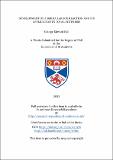Development of a BMIDA Larock reaction and its application in total synthesis
View/
Date
14/06/2023Author
Supervisor
Funder
Metadata
Show full item recordAltmetrics Handle Statistics
Altmetrics DOI Statistics
Abstract
Indoles are ubiquitous in natural products and in pharmaceuticals. Methods for their synthesis range from the classic Fischer synthesis to more modern, transition metal-catalysed reactions. One such method of indole synthesis is the Larock reaction, where a 2-haloaniline (usually iodoaniline, although recently, Larock reactions using bromo- and chloro-anilines have been disclosed) reacts with an internal alkyne, in the presence of Pd catalyst and a base (a chloride additive is often beneficial) to give a 2,3-disubtituted indole. A key feature of the Larock indole synthesis is its excellent regioselectivity, if one of the groups on the alkyne is larger than the other. Work in this thesis concerns the Larock reaction of 2-iodoanilines and borylated alkynes to form 2,3-difunctionalised indoles bearing a useful synthetic linchpin, N-methyliminodiacetic acid boronic ester (BMIDA), at the 2-position. The second chapter of this thesis concerns the optimisation of this so-called BMIDA Larock reaction on a model substrate. These optimised conditions would be used to create a variety of indoles bearing varied functionality about the benzenoid core of the indole and at the C-3 of the indole, all with a BMIDA group at C-2 which is amenable to Suzuki-Miyaura cross-coupling. It was found that two sets of conditions would be required depending on whether the carbon attached to the C-3 of the indole product would be sp2 or sp3. It was discovered that the relatively bulky BMIDA group was large enough to leverage the regioselectivity of the Larock reaction, resulting in the BMIDA group being reliably placed at the C-2 of the indole products. The third chapter involves using this developed methodology in the total synthesis of indole alkaloids. Initially, three alkaloids were targeted, each of which were proposed to be made in just several steps from a common intermediate. However, two of these failed due to the inability to form a macrocycle in one, and unexpected reactivity during a ring-closing step in the other. The third alkaloid, Goniomitine, was successfully synthesised.
Type
Thesis, PhD Doctor of Philosophy
Collections
Description of related resources
Development of a BMIDA Larock Reaction and its Application in Total Synthesis (thesis data) Bell, G. & Watson, A.,, University of St Andrews, 16 May 2023. DOI: https://doi.org/10.17630/2cc1b110-6dd7-450c-9e79-e7cebce1702bRelated resources
https://doi.org/10.17630/2cc1b110-6dd7-450c-9e79-e7cebce1702bItems in the St Andrews Research Repository are protected by copyright, with all rights reserved, unless otherwise indicated.

